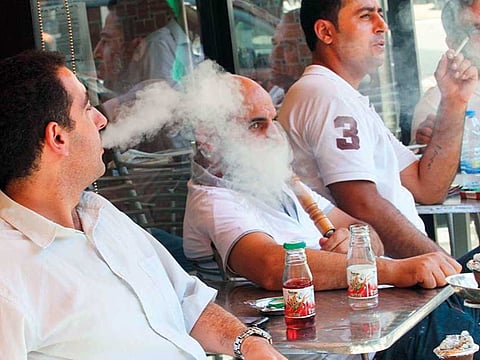Lebanon ranked third globally in smoking
Law to curb smoking is very difficult to enforce in a country where smoking is somewhat of a cultural tradition

Beirut: Lebanon has been ranked third globally for having the most smokers per capita, according to the data released by the World Health Organisation (WHO) for the year 2015.
Lebanon has been ranked poorly despite Law 174, which was approved by Najib Mikati’s Cabinet in 2012, and that intended to limit cigarette consumption, at least in public places like restaurants.
Although the antismoking law remains in effect, it is very difficult to enforce it in a country where smoking is somewhat of a cultural tradition.
The law that banned indoor smoking irritated Lebanese accustomed to shishas and cigarettes at restaurants, cafes, pubs and nightclubs.
The law was applauded by a vocal minority in the country advocating for improving overall health of the people.
The law, however, is effectively defunct, due to a lack of effective enforcement mechanisms.
According to the WHO, Lebanon’s daily per capita consumption in 2015 was reportedly between 8 to 9 cigarettes, “which calculates out to an average of 3,023 cigarettes per capita annually”.
As tobacco products are not regulated for their contents [nicotine and/or tar] as well as emissions in Lebanon, and nearly 42 per cent of 13 to 15-year-old males and around 32 per cent of females in the same age-bracket reportedly smoke tobacco products, Lebanese face serious health issues.
“I don’t care about any legislation or bans,” Antoine Doumit, 16, who works at a grocery store in Antelias told Gulf News, while he lit up his cigarette.
After introduction of Law 174 in 2012, Beirut pledged to impose strict fines on cigarette companies who failed to carry a visual warning of the health impacts that tobacco consumption generates, on every cigarette pack. While a few manufacturers abided by the regulations, most did not.
Today, there are written warnings on cigarette packs sold in Lebanon, but without any pictures as is customary in most countries.
Notwithstanding Law 174 and successive governmental pledges to abide by the WHO Framework Convention on Tobacco Control, which Lebanon signed in 2005, Beirut condones the Lebanese Authority for Tobacco and Tombac, which is a state-sponsored organisation) manufacturing tobacco products at reduced prices, because it fills their coffers.
Lebanon introduced a new tax on tobacco products earlier this year — 200 Lebanese pounds ($0.13) on a pack of cigarettes, and 500 Lebanese pounds ($0.33) on a pack of cigars. This tax hike is expected to boost VAT revenues by 10 per cent and based on 2016 VAT figures, could add $215 million to the treasury in 2017. An additional $100 million would also go into state coffers through the fiscal stamp fees, which must be affixed on every package of tobacco products too.
Lebanon imports tobacco worth $160 million annually primarily from Turkey, Switzerland, Egypt and Germany.



